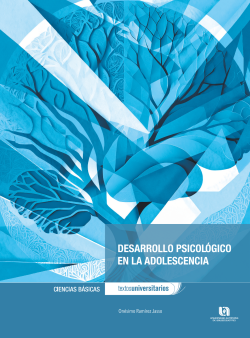PSYCHOLOGICAL DEVELOPMENT IN ADOLESCENCE
Synopsis
The study of the psychological development of individuals can provide us with a comprehensive understanding of their behavior, as it allows us to see the origin, formation, and transformation of both their psychological structure and functioning. It also offers explanations for why certain behaviors occur and not others in specific circumstances and also gives us a basis for grounding some predictions about them. All of the above would not be possible if we were limited to the description and explanation of discrete behaviors, disregarding the process in which they acquire full meaning.
In a particular way, any treatise on adolescent psychology or any theory about adolescence runs the same risk if it is isolated from the general context of development, since this period of life has no reason for being in itself, but rather in relation to what precedes and what follows it. What happens during adolescence can be understood thanks to the psychological structures that have been previously formed (for example, the appearance of interests could not be understood if there were not already a reaction scheme to the elements of attraction of stimuli; the same would happen in relation to formal logical thinking, if there were not already a structure of concrete thinking). And it can also be understood what happens during this stage if we pay attention to its orientation, which is none other than to move towards adult behavior (the formation of the affective emotional world makes sense in terms of future choices, decisions, and commitments, during adulthood; likewise, intellectual functioning is refined and transformed towards a reflective, analytical activity, whose full potential is precisely found in adult performance).
In this sense, it is understandable that during adolescence there are great transformations not only at the biological level, but above all at the psychological level and with a wide resonance in the sociocultural field. In this text, whose intention is to serve as a basis for the course "Psychological Development during Adolescence" taught in the fourth semester of the Psychology degree, the study of psychological development that occurs during the ages of 11-12 to 18-21 years is privileged. What this means is that we do not deal with the problems that are conventionally assumed during this stage; not because they are not of social interest and of interest to the psychology professional, but because the specific intention of this work is psychological development and, on the other hand, because we defend that it is precisely the peculiar development that happens during this stage that makes it "adolescence" in a psychological sense.
Focusing on what has been stereotyped as "problems typical of adolescence" is to deal with facts specific to certain times and particular cultures. What makes adolescence only a sociological, cultural, and historical fact. Therefore, it is not universal or generalizable. Even what is considered a "problem" in one country or culture is very likely not to be considered a problem in another country or culture or at another time. On the other hand, if we attend to the description and explanation of the origin, transformation and development of the psyche, then we would be dealing with a reality that arises from the interaction between the biological and the social, and that has the characteristic of being gradual and progressive (since it is a reality in fieri), which acquires higher levels exclusively in humans and that, in the case of adolescence, psychic formations and transformations occur that could not have occurred before and will not occur later. All of the above is what makes this stage, because it is specific to the human species, a universal stage.
The text is organized based on the structure of the program of the aforementioned subject. Therefore, it consists of four units and each, in turn, of some chapters in which the corresponding curricular contents are analyzed. For methodological reasons, psychological development is approached considering four areas: psychomotor, affective, social, and intellectual. The above does not mean that it communicates with the idea of an atomized human being and even less with partial assessments that justify biased valuations of the person.

Downloads
Published
Series
Categories
License

This work is licensed under a Creative Commons Attribution-ShareAlike 4.0 International License.













